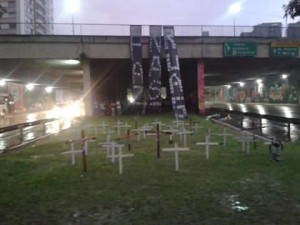“And I, if I am lifted up from the earth, will draw all peoples to Myself.”- John 12:32
Last year, eight children and teens died in the streets. Most of them were buried in unmarked graves without any funeral or memorial services. In most cases, the families were notified weeks after their passing and in extreme cases, there was no one to notify. Whenever a homeless person dies in the streets whether they are adults or children, the Brazilian Law requires that the burial takes place one day after the death. If no one claims their bodies within 24 hours, they are buried in unmarked graves without anyone present. All the social service groups working in the streets decided that we needed to do something to remember the lives of these little ones. They were special to us and we wanted to show that we miss their presence in this world. We decided to organize an event in remembrance of these forgotten ones.
Of all the agencies, we have the smallest team. Consequently, we could not afford the time and manpower to participate in the organization of this event. The other agencies graciously included us in the event despite our minimal involvement. We are also the only religious group in the mix and our lack of participation meant that the religious element would also be missing in the event. This is not to say that there are no religious people working in these groups, but these agencies are expected to avoid any religious reference in their work approach. We were the only ones with this liberty.
The event was held on a Friday. The agencies put together a banner with the names of the children with personalized notes written by people and children who knew them. These notes were joined together to form the words: Peace in the Streets. There were eight crosses with the names of the children and teens who passed away and there were about twenty other crosses for those who died in yesteryears that were never remembered in any way. The plan was for us to walk together to all the places where the children died and place a memorial plaque with the name of the respective children.
It was a simple event. It began with a passionate speech from one of the leaders of the social agencies and he talked about injustice and the need to fight for the rights of the children. After him, someone else spoke along the same lines. The message was a political one but it did not seem appropriate for the moment. For starters, most of the children died of drug abuse and three were murdered. I am not sure that in a just society such deaths would not occur. Social injustice has a role to play in the situation of the homeless, but murder and drug abuse occurs in every society. I don’t think political reform could have stopped these deaths. The problem is beyond politics. It is deals with something deeper and more profound. It is sin. We live in a sinful world. However, sin is also a religious word and the secular agencies do not have the vocabulary to address this in their discourses. They think that sin means blaming the victims. This would be a narrow view of the concept. The broader view gives a more realistic view of life. Not everything can be solved by social and political reforms.
In the speeches that were made, the names and lives of the children and teens were hardly mentioned. It is strange that they would be even forgotten in an event to remember them. I don’t think this was deliberate, but I think that social agencies have very little to say when someone dies. However, those who knew and loved these children and teens were not there for a political event but they wanted to know about their loved ones now. They wanted a message of hope for them. Politics has nothing to say to those who have died.
The event ended with planting of all the Crosses in the area where the last boy died in December. For many, perhaps the Cross was just used to mark the graves. However, for us, it reminded us why we are here. It is the power of this symbol that has brought us to this place. The Cross reminded us that there is a gracious God who resurrected His Son to shine His light in this world even though the world did not deserve Him. The Cross is not about who we are or what we have done but it is about Him who is able and willing to overcome death and changed its meaning forever.
As we begin this Holy Week, I am reminded of the importance of the Cross in our work. It changes our message and approach in our ministry. We are not here to push for political reforms. Our world view makes us realize that politics is helpless in the face of deep human problems, just as Pontius Pilate was helpless to change the fate of Jesus. No one could change the helplessness or powerlessness of humanity at the feet of the Cross except for the One who hung on it. He is the One who is able to bring hope even in a seemingly hopeless situation. Seeing the field covered with Crosses reminded me that death does not have victory over Grace.


